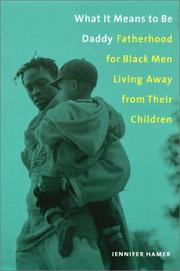| Listing 1 - 6 of 6 |
Sort by
|
Book
ISBN: 0199371164 0199371156 9780199371150 0199371148 9780199371143 Year: 2015 Publisher: New York
Abstract | Keywords | Export | Availability | Bookmark
 Loading...
Loading...Choose an application
- Reference Manager
- EndNote
- RefWorks (Direct export to RefWorks)
Slandered as irresponsible, deadbeat dads, nonresident fathers are a greatly misunderstood population. These fathers are overlooked in discussions of poverty and economic vulnerability-often being viewed as the cause of social problems, rather than as having been abandoned by society. In Failing our Fathers, Ron Mincy and his colleagues present a more comprehensive picture of how these men face significant obstacles and explore unintended effects of policies designed to secure financial support for their children, the effectiveness of the few policies that have been designed to offer relief. A
Absentee fathers --- Fatherhood --- Father and child --- Absent fathers --- Noncustodial fathers --- Fathers --- Custody of children
Book
ISBN: 1536115665 9781536115666 9781606923825 160692382X Year: 2011 Publisher: New York
Abstract | Keywords | Export | Availability | Bookmark
 Loading...
Loading...Choose an application
- Reference Manager
- EndNote
- RefWorks (Direct export to RefWorks)
Child welfare --- Children --- Absentee fathers --- Absentee mothers --- Single-parent families --- Absent mothers --- Noncustodial mothers --- Mothers --- Custody of children --- Absent fathers --- Noncustodial fathers --- Fathers --- Social conditions.
Book
ISBN: 0826266541 9780826266545 9780826218216 0826218210 Year: 2009 Publisher: Columbia London University of Missouri Press
Abstract | Keywords | Export | Availability | Bookmark
 Loading...
Loading...Choose an application
- Reference Manager
- EndNote
- RefWorks (Direct export to RefWorks)
"Examining the works of Langston Hughes, Richard Wright, Malcolm X, and Barack Obama, Green portrays the intersecting experiences of generations of black men during the twentieth century both before and after the civil rights movement, revealing the impact of fatherlessness on racial and gender identity formation"--Provided by publisher.
Fathers and sons --- Fatherless families --- Children of single parents --- African American authors --- African American men --- Absentee fathers --- Families, Fatherless --- Father-separated children --- Fatherless family --- Matrifocal families --- Single-parent families --- Children of single fathers --- Children of single mothers --- Single parents' children --- Single parents --- Children of divorced parents --- Absent fathers --- Noncustodial fathers --- Fathers --- Custody of children --- Psychology. --- Social conditions.
Book
ISBN: 9786610332502 1134607229 1280332506 0203252373 0203028775 9780203252376 1134607210 Year: 2002 Publisher: London New York Routledge
Abstract | Keywords | Export | Availability | Bookmark
 Loading...
Loading...Choose an application
- Reference Manager
- EndNote
- RefWorks (Direct export to RefWorks)
Discusses the social implications of absentee fathers. Provides a text for undergraduates in social policy and should also be important for professionals concerned with family breakdown and child support.
Absentee fathers --- Custody of children --- Child support --- Family life surveys --- Social surveys --- Child maintenance --- Desertion --- Support of children --- Child welfare --- Maternal and infant welfare --- Child custody --- Children --- Children, Custody of --- Parental custody --- Divorce --- Divorce mediation --- Guardian and ward --- Parent and child (Law) --- Absentee mothers --- Parental relocation (Child custody) --- Visitation rights (Domestic relations) --- Absent fathers --- Noncustodial fathers --- Fathers --- Custody --- Law and legislation

ISBN: 0807876585 9780807876589 9780807830703 0807830704 9780807857793 0807857793 9798890867827 Year: 2007 Publisher: Chapel Hill University of North Carolina Press
Abstract | Keywords | Export | Availability | Bookmark
 Loading...
Loading...Choose an application
- Reference Manager
- EndNote
- RefWorks (Direct export to RefWorks)
Shedding light on contemporary campaigns to encourage marriage among welfare recipients and to prosecute "deadbeat dads," this book traces the efforts of Progressive reformers to make "runaway husbands" support their families. It analyzes the history of antidesertion reform from its emergence in social policy debates.
Poor women --- Women heads of households --- Jewish women --- Absentee fathers --- Desertion and non-support --- Public welfare --- Welfare recipients --- Public welfare recipients --- Poor --- Abandonment of family --- Non-support --- Divorce --- Domestic relations --- Husband and wife --- Support (Domestic relations) --- Absent fathers --- Noncustodial fathers --- Fathers --- Custody of children --- Women, Jewish --- Women --- Heads of households --- Feminization of poverty --- Women, Poor --- Social conditions. --- Economic conditions. --- Law and legislation --- Economic conditions --- National Desertion Bureau, New York --- NDB --- New York (N.Y.). --- History.

ISBN: 0231505108 9780231505109 0231115547 9780231115544 0231115555 9780231115551 Year: 2001 Publisher: New York, NY
Abstract | Keywords | Export | Availability | Bookmark
 Loading...
Loading...Choose an application
- Reference Manager
- EndNote
- RefWorks (Direct export to RefWorks)
Absent fathers, the breakdown of the nuclear family, and single-mother households are often blamed for the poor quality of life experienced by many African American children. Jennifer F. Hamer challenges both the imposition of an inappropriate value system and the resulting ineffectual social policies. Most of what we know about fathers who do not live with their children is based on interviews with the mothers; this book is based on interviews with the fathers themselves. How do these fathers perceive their roles and responsibilities? This myth-shattering book challenges stereotypes of negotiating parenthood within the context of poverty, live-away status, and black American manhood. Hamer has collected the voices of eighty-eight men who participated in this study by first examining the macro or cultural elements that encompass men's daily lives. As part 1 explores these larger forces that define the social world of fathers, part 2 looks at what significant others expect of men as fathers and how they behave under these circumstances. Part 3 analyzes the particular parenting roles and functions of fathers, using narratives of individual men to tell their own stories. In this book, contemporary black live-away fathers talk about their goals, walk us through their workplaces, allow us to meet their families and children, and enable us to view the world of parenthood through their eyes.
African American fathers --- Absentee fathers --- African American families --- Fatherless families --- Fatherhood --- African Americans --- Ethnic & Race Studies --- Gender & Ethnic Studies --- Social Sciences --- Afro-Americans --- Black Americans --- Colored people (United States) --- Negroes --- Africans --- Ethnology --- Blacks --- Parenthood --- Families, Fatherless --- Father-separated children --- Fatherless family --- Matrifocal families --- Single-parent families --- Afro-American families --- Families, African American --- Negro families --- Families --- Absent fathers --- Noncustodial fathers --- Fathers --- Custody of children --- Afro-American fathers --- Fathers, African American --- Psychology --- History --- Social aspects --- Social conditions --- Black people --- African American families. --- Fatherless families. --- Fatherhood. --- African Americans. --- Social conditions.
| Listing 1 - 6 of 6 |
Sort by
|

 Search
Search Feedback
Feedback About UniCat
About UniCat  Help
Help News
News